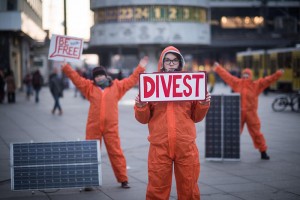Climate Change, Divestment and the Power of Youth
Apr 9th, 2015 | By admin | Category: Climate ChangeBy Kimberly Absher, guest youth blogger, www.howmany.org.
This April 22nd marks the 45th anniversary of Earth Day. With a rich history beginning in 1970, when 20 million Americans took to the streets, their actions led to the creation of the Environmental Protection Agency and the passage of critical laws to protect our air, water, and endangered species.
Since last Earth Day, major environmental victories have been won, including the Keystone XL Pipeline veto and a momentous movement for global fossil fuel divestment. The campaign has converted huge players like the city of Oslo, The Guardian, Stanford University, and most recently Syracuse University, and executed a hugely successful Global Divestment Day in February. 350.orgis an instrumental force in spreading tactics to its network of grassroots organizers, and supporting partner organizations spanning the globe.I reached out to 350.org’s Divestment Campaign Manager Jenny Marienau, and she gave me her inspiring thoughts on this past year, the future of environmental justice, and the critical role of youth activism in climate movements.
On the role of youth activists in the Divestment campaign:
Youth activism is the beating heart, and plays many roles in divestment, not the least of which was launching the idea. We work with all kinds of people on divestment, from pension fund boards, to faith leaders, to socially responsible investment professionals, but when you get down to it, youth activists are a big part of why we are seeing cultural shifts around divestment. Without a vibrant, self-directed, morally-guided youth movement, the UN wouldn’t have endorsed us. The campaign wouldn’t be on the front page of The Guardian.
Challenges and highlights of the past year:
You know, there have been a lot of things that look like challenges from a distance that really aren’t, like the pushback we’ve been seeing from oil industry PR groups. This year, we’ve seen industry front groups like the American Energy Alliance amp up their resistance to the divestment campaign with silly PR stunts and fear-based arguments.
But for us, that’s just an indication that we’re making enough of an impact to scare them. It’s the same playbook the tobacco industry used. You know the quote, ‘First they ignore you, then they laugh at you, then they fight you, then you win’? They’re definitely fighting us.
The real challenge is knowing how to use all the opportunities we have. How do we support the thousands of new organizers who have been mobilized by this campaign to build their skills? How do we build strong relationships with the other vibrant movements for social, racial and economic justice that are taking the world by storm? How do we harness the energy of all the people rooting for us to take the fossil fuel industry down? Sometimes it feels like we’re just running to keep up with this movement, which I guess is a good sign.
How the future looks:My feelings about the future seem to depend on the day; it can feel like the global news and our movement are playing tug-of-war with your heart. For every terrifying story like the seven new methane craters in Siberia, there’s a reason to hope, like seeing thousands of activists taking action on six continents for Global Divestment Day.
The most encouraging thing, though, is that more and more I see the social justice silos dissolving. Divestment activists can hold that climate change matters, and the fight for a $15 minimum wage matters, and breaking down the prison industrial complex matters, and all of these fights can build each other’s strength. That’s incredibly encouraging, because we’re fighting for a collective future.
A message for youth:
People have been telling you your whole life what’s realistic – how the world is. But we are making decisions about how the world is going to be every day. Doing nothing is a choice. Defending the status quo is a choice. Fighting for something new and better is a choice. It’s our responsibility to imagine the world that is possible, and to organize until we’ve shifted what’s “realistic” to match what we know we need. A big part of that is holding the institutions we’re a part of responsible for the way their choices impact our collective future. Divestment from fossil fuels is a good start, but it’s not the end either.
You can read more about the 350.org and Fossil Free divestment campaign on their website. So readers, what are you doing for Earth Day? After reading about the amazing strides of youth activists, I’m motivated to join the campaign for my own alumni to divest. And, of course, go out and gratefully enjoy the earth!
Kimberly Absher enjoys combining her love of writing and creating social change as often as possible. She writes about health, gender, personal development, and more at kimberlyabsherwrites.com.


